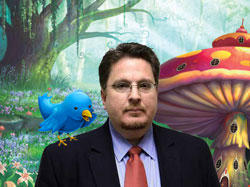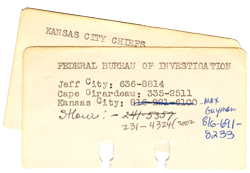Pal George flew into San Antonio for a meeting today (yes, his arms are tired). Shortly after checking into his hotel –and before posting a single tweet– he received the following email:
> From: Twitter
> Date: March 3, 2009 4:44:23 PM CST
> To: [George’s email address]
> Subject: Visit San Antonio is now following you on Twitter!
>
> Hi, georgekopp (georgekopp).
> Visit San Antonio (VisitSanAntonio) is now following your updates on Twitter.
> Check out Visit San Antonio’s profile here:
> http://twitter.com/VisitSanAntonio
> You may follow Visit San Antonio as well by clicking on the “follow” button.
> Best,
Others will figure this out before I do, but it would seem that the VisitSanAntonio (CVB?) folks were able to access the hotel’s dB of guests as they register. Then search Twitter and start following any successful hits.
Anyone see another way this could be accomplished? Not sure I’d be okay with the hotel sharing even the fact of my registration. Reminds me of something similar that happened to Barb and me on a visit to Las Vegas.
UPDATE: The mystery has been solved.
Hi Steve,
I hope that your friend George was pleasantly surprised with our follow today. When he mentioned that he was “heading to San Antonio today. Waiting in the airport,” I thought he might have a few questions about what San Antonio has to offer.
As a part of SACVB’s efforts to engage individuals who are considering or on their way to San Antonio, I monitor Twitter daily. Through this monitoring, I have been able to help travelers find great margaritas on the River Walk, recommend which historic sites to see on a quick trip through town, and help one visitor find where a not-so-popular soccer game was going to be shown on TV.
We’ve really enjoyed the interaction that Twitter has allowed us to have with our visitors.
Hope you consider visiting us soon. You too can find out about all of San Antonio’s great sites by contacting me @VisitSanAntonio.
Have a great night,
Taylor @ SACVB
Why didn’t it occur to me that someone with the San Antonio CVB was monitoring the Twitterverse for references following? It was just coincidence he checked his Twitter feed when he hit town and got the message.
This is a great example of how to use Twitter and and the blogosphere. Taylor found my post and commented. Wonder how many other CVB’s are this clued in?

 I’m one of a few hundred (but growing fast) “followers” of
I’m one of a few hundred (but growing fast) “followers” of  One of the reporters in one of our newsrooms has a Rolodex that goes back 30+ years. The cards are worn from handling and yellowed by the years. I have no idea if he also maintains some kind of computer file as well. Doubtful.
One of the reporters in one of our newsrooms has a Rolodex that goes back 30+ years. The cards are worn from handling and yellowed by the years. I have no idea if he also maintains some kind of computer file as well. Doubtful.